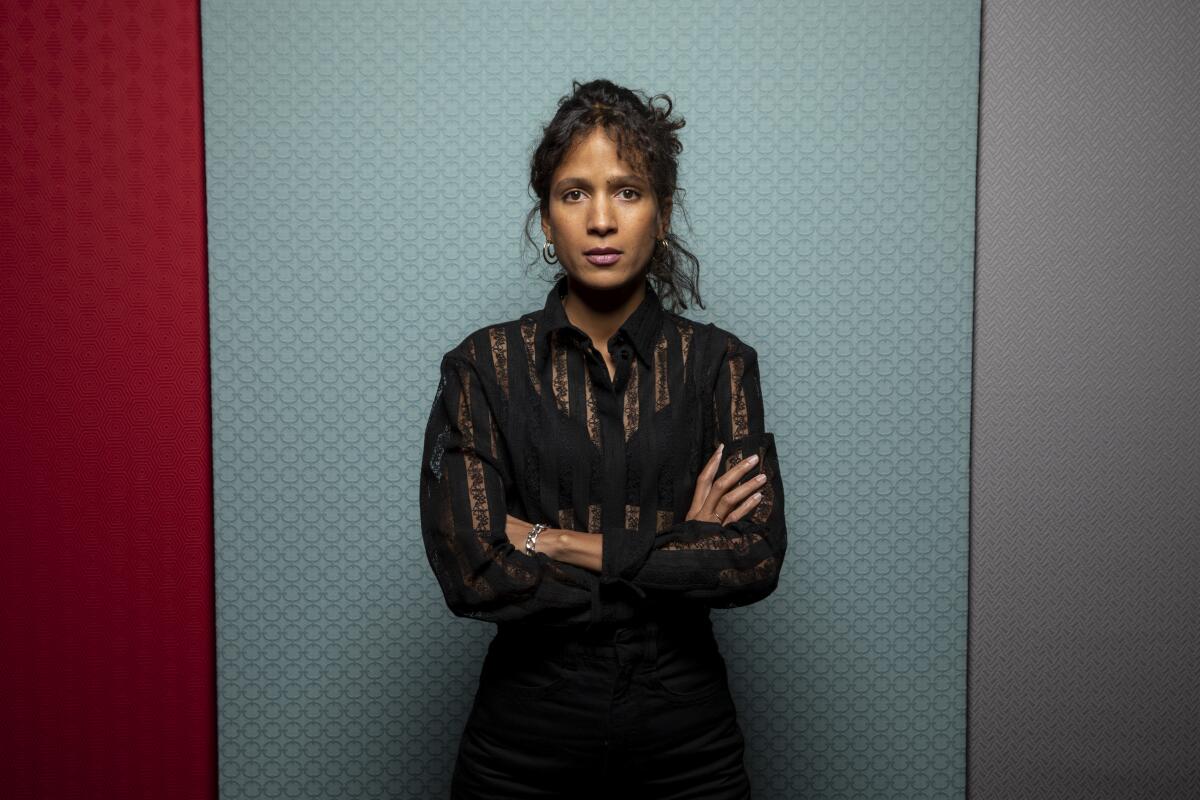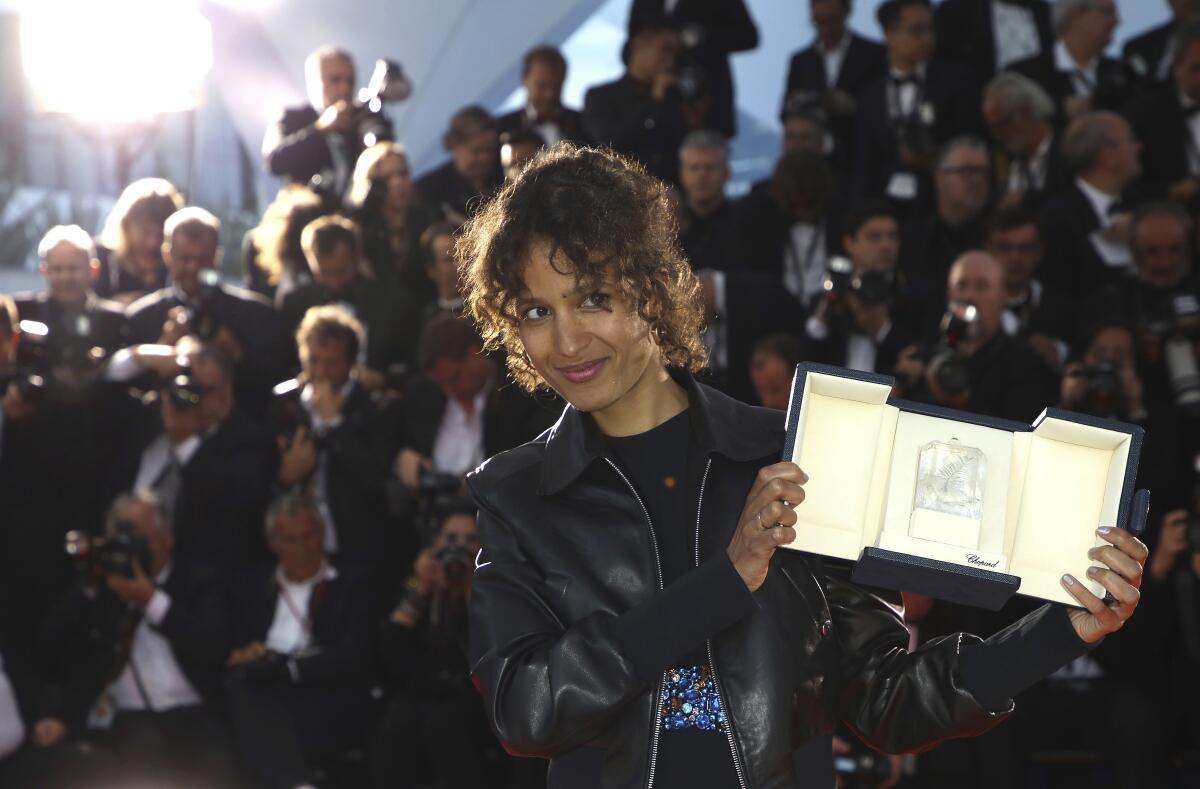Mati Diop on her story of ghosts and lost love in ‘Atlantics,’ Senegal’s Oscar entry

Mati Diop’s fiction feature debut “Atlantics” was a groundbreaking work even before it won the Grand Prix at this year’s Cannes Film Festival. It was the first film by a black female director chosen for the prestigious main competition at the festival.
Since receiving the prize, awarded by the jury at Cannes led by director Alejandro Iñárritu, “Atlantics” has dazzled on the festival circuit. It’s played in Toronto, New York, London and recently at L.A.’s AFI Fest. Diop received the inaugural Mary Pickford Award for emerging female talent at the Toronto International Film Festival, and “Atlantics” was selected to be Senegal’s entry for international film feature at the Academy Awards.
Diop was born in Paris to a French mother and a Senegalese father. Her uncle is the acclaimed Senegalese filmmaker Djibril Diop Mambéty, widely acknowledged as one of the most influential directors of African cinema, who died in 1998.
Diop’s credits as an actress include Claire Denis’ “35 Shots of Rum” (“35 Rhums”), Antonio Campos’ “Simon Killer” and Matias Piñero’s “Hermia & Helena.” She also made a series of short films, including the documentary “A Thousand Suns,” in which she tracked down the lead actor from her uncle’s landmark 1973 film “Touki Bouki.” She also made a 2009 short “Atlantiques,” which formed the basis for her feature debut.
For the feature version of “Atlantics,” Diop drew from a wide range of influences for mood and imagery, from Thai filmmaker Apichatpong Weerasethakul to American films such as John Carpenter’s “The Fog” or Michael Mann’s “Miami Vice.” Her cast is largely non-professional actors that she found after months of searching Senegal’s capital of Dakar.
In the film, a young woman Ada (Mama Sané) is caught between Souleiman (Ibrahima Traoré), the young laborer she loves, and Omar (Babacar Sylla), the spoiled rich kid to whom she has been promised in marriage. After Souleiman abruptly leaves in search of work elsewhere, Ada is heartbroken, especially when he and others are believed to have disappeared at sea. Then it seems the spirits of those lost begin to possess the bodies of those who remain. With cinematography by Claire Mathon and a score by electronic musician Fatima Al Qadiri, the film has a hypnotic impact.
The film recently received a limited theatrical release and will be on Netflix beginning Nov. 29. Diop sat for an interview recently while in Los Angeles.
As “Atlantics” makes its way around the world, how are you finding the movie playing for different audiences? Are there things that they respond to differently?
I’m a bit surprised that between a French, American and Senegalese audience I actually don’t find a huge difference in terms of how they receive the film. Of course Senegalese audiences understand the language so they have more subtleties. I was expecting more differences, more singularities between the different audiences. But actually it’s quite like one and the same voice. Which I’m very touched about because it means that at the end the film is very accessible and universal and it doesn’t enclose, it opens.
The movie keeps changing as you watch it. It seems at first like a romantic drama and then it’s a little bit of a procedural thriller and then it becomes this mystical ghost story. What made you want to have the story evolve in that way?
I think the film looks a lot like my own personal relationship with cinema and the multiple influences, the cultural, aesthetic, social mix of backgrounds I come from. Also, I’m not an academic, but a self-taught person, an autodidact. I think one of the strengths of being an autodidact is that I’ve created my own relationship to cinema and I don’t really hierarchize popular culture. As a French person I always felt a bit of an outsider because as a mixed woman, I really evolved in multiple cultural and family environments. And so I think the film really wants to circulate in a very free way between genres. It really came from the internal needs of the film.
I really wanted to show that my first feature was going to be in Dakar in Senegal with black characters... I really decided that cinema needed this film much more than another French film with white teenage girls.
— Mati Diop, director of “Atlantics”
And also the fact maybe that one of the reason why I made this film — there are so many reasons — but one of the intentions was that I really wanted to show that my first feature was going to be in Dakar in Senegal with black characters. And that was very intentional politically. I could have made a first feature in France, but I really decided that cinema needed this film much more than another French film with white teenage girls. And that was very conscious; I think that I’ve lacked so much of black characters on screen myself as a spectator. So maybe I even wanted my black characters to be put in so many different situations — let’s have them in one film like we’ll see a cop working, we’ll have a love story and the girls will walk like zombies in the city.
Do you see your filmmaking as connected to your uncle’s work?
Absolutely. I mean, I come from this family and not from another one. So I think that of course the films of my uncle are very influential in terms of this very singular form. I mean as objects they are very strong and amazing, but it has less to do with what they look like and what they are than the fact that I think that the premature passing of my uncle forced me to really position myself more clearly.
My starting as a filmmaker has a lot to do with his premature passing, because when he passed away, I was very young, I was 16. I was not even into cinema, but in 2008, it was 10 years after his passing and I was around 25 and I was starting to really want to become a filmmaker. And I think that I really measured and realized his heritage and the importance of his legacy. I think it has obliged me to really decide clearly in terms of my engagements, like what cinema do I really want to defend today? And even though I’ve never felt like I should carry or follow a mission, I don’t carry my legacy as something heavy or constrained. I still felt something had to be continued, in my way.

What was the experience like going to Cannes and winning an award there? And then from there being given another award in Toronto and being selected as Senegal’s entry for the Academy Awards? Did you expect so much attention for you and the film?
At Cannes, everything was very overwhelming. I had just finished my film and people tend to forget that making a movie is something quite intense to do. What I mean by that, it’s years of creation and battling and it’s a huge effort. And I had just come out of seven months of editing. From this very extreme digging into the creation and the essence of the film, I was suddenly thrown out there and there was no transition.
So this made it very overwhelming for me because I had to integrate the fact that my first feature was going to competition and that I was the first black woman going there. That’s a lot to take it. And also in Cannes, it’s not a place where you sit and really develop ideas and dialogue around the film like we’re doing now. For me, it was a bit hard because the film comes from a very intimate and political place. The film is really the opposite of something that you can put in a box.
More to Read
Only good movies
Get the Indie Focus newsletter, Mark Olsen's weekly guide to the world of cinema.
You may occasionally receive promotional content from the Los Angeles Times.











